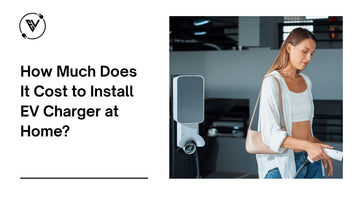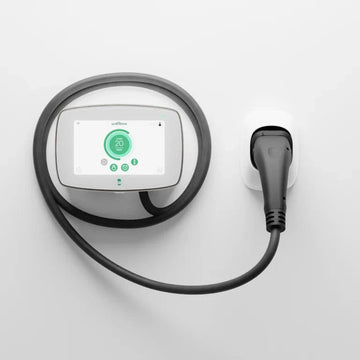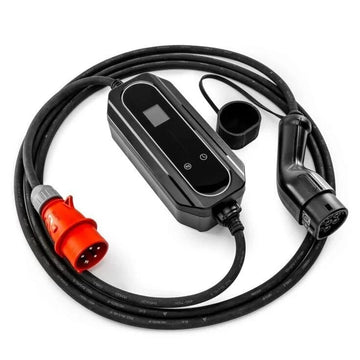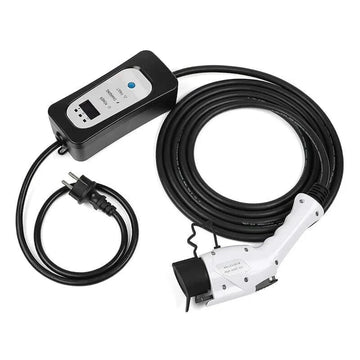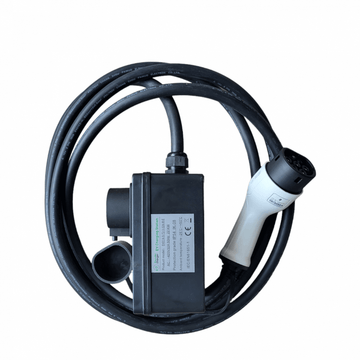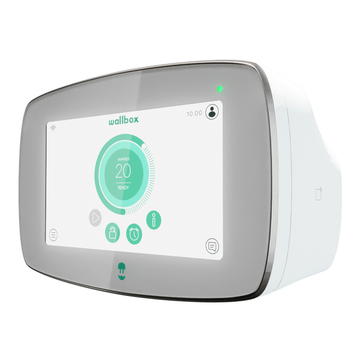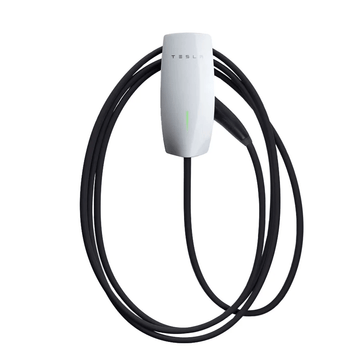Home EV chargers are devices that allow you to charge your electric car using your home's electricity supply. They are typically wall-mounted units installed indoors or outdoors and offer faster, safer, and more convenient charging than a standard three-pin plug.
Average Cost to Install EV Charger at Home in 2025
The cost to install an EV charger at home in 2025 typically ranges from 900€ to 1,500€ for a standard 3kW or 7kW setup, including installation by a qualified electrician. A 22kW charger may cost between 1,500€ and 2,200€, but requires a three-phase power supply, which could add 1,000–2,500€ if your home needs an upgrade. Final pricing varies based on charger type, distance from the fuse box, and any additional work like trenching or system upgrades.
Typical Price Range for Home Electric Car Charger + Installation

The typical cost to install an EV charger at home ranges from 900€ to 1,500€, covering a standard installation process, charging cable, wall mounting, and connection to your consumer unit and electricity meter. You can choose between a tethered or untethered charger, depending on whether you want to use your own cable. An isolator switch may be required for some setups. Also,type 1 or type 2 adapter might be needed which adds an additional cost of around 100€.
Charging from home lets you charge an electric car overnight using lower energy prices, often cheaper than using a public charger or public charging station. Here are the standart charger prices:
- 3kW charger: 900€–1,200€
- 7kW charger: 1,000€–1,400€
- 22kW charger: 1,500€–2,200€
These prices have installation included by a qualified electrician and usually cover a smart charger with Wi-Fi connectivity.
Cost Difference Between 3kW, 7kW, and 22kW Units
Cost of charging electric car at home certainly varies on charger kW units:
- 3kW units are considered slow chargers and are suitable for plug-in hybrids or occasional charging. They are cheaper but take much longer to fully charge a vehicle.
- 7kW units are the most popular for UK homes. They can fully charge an electric car overnight and offer a balance between price and speed.
- 22kW home chargers are amongst ultra rapid public chargers but require a three-phase electricity supply, which most homes don’t have. Upgrading your supply can add 1,000–2,500€ to the total car charger installationcost.
The final electric vehicle charger installation price depends on your specific home setup and charger type.
What Affects the Final Installation Cost?

The final installation cost depends on a few factors that we list below:
Type and Power of Charger
The more powerful the home EV charger, the higher the installation cost. A 3kW charger is cheaper to install than a 22kW one. However, faster charging often justifies the higher price due to time savings. So, some chargepoints are harder to install than others, taking more time and effort.
Distance from Fuse Box and Cable Routing Complexity
The further the charger is from the main fuse box, the higher the EV home charger installation cost. Routing cables through multiple walls, ceilings, or underground will raise the extra cost. For wall-mounted options, take a look at available EV wall chargers compatible with most homes.
Extra Work: Trenching, Wall Drilling, Isolator Switch
If, for example, you live in an old house with three-foot-thick exterior stone walls, the time, care and effort these will take to drill through will affect installation costs. Non-standard installations may involve:
- Trenching for underground cables: 100–300€
- Wall drilling through thick or double brick walls: 50–150€
- Isolator switch installation: 100–200€
These are not part of standard installations and count as additional cost.
Electrical System Upgrades or Fuse Box Replacement
If your home’s electrical system is outdated, upgrades may be necessary:
- Fuse box replacement: 300–700€
- CT clamp or smart meter integration: 50–150€
- Upgrading to three-phase power: 1,000–2,500€
These other factors can significantly increase your EV charger installation cost.
Can I Install an EV Charger Myself?
Yes, you can install an EV charger yourself, but it’s not generally recommended unless you're a qualified electrician. Installing EV chargers involves working directly with your electricity supply, fuse box, and possibly upgrading your consumer unit. For safety, legal compliance, and to ensure your electric car charger installation qualifies for any government grants, it's best to hire a professional.
Why Professional EV Charger Installation Is Recommended
- Safety & Compliance: A professional ensures the car charger installation complies with local regulations and is safely connected to your electricity meter and isolator switch.
- Integration with Home Systems: A qualified installer can integrate your home EV charger with smart charging features, solar panels, or battery storage to make the most of renewable energy and lower energy prices.
- Proper Assessment: They’ll assess if your fuse box and electricity supply can handle the added load, especially if you plan to charge an electric car overnight.
Key Considerations Before Installing EV Chargers
- Do you have an off street parking? It's a must for home charger installation.
- What’s your car’s battery size and daily range need?
- Do you want a tethered or untethered charger? Untethered units let you use your own cable.
- Check eligibility for grants under the electric vehicle homecharge scheme.
- Compare charger installation costs between providers.
How Long Does It Take to Install a Home EV Charger?
A standard home EV charger installation typically takes 2 to 4 hours. More complex jobs can take a full day.
What’s Typically Included in the Installation Service
- Wall mounting of the home charger
- Up to 10m of cable from fuse box to charger
- Drilling through one wall
- Connection to existing power supply
- Safety testing and certification
- Setting up the charger’s Wi-Fi or smart features
Some installers also offer hassle free installation packages that include a site survey.
Charging Your EV at Home: Costs and Time

One of the biggest advantages of home EV charger installation is the ability to charge your electric car overnight at a much lower cost compared to public charging. But how much does it really cost to charge an electric car at home?
How to Calculate Cost: Battery Size × Electricity Rate
To work out the cost of charging an electric car at home, simply multiply your car’s battery size (in kWh) by your electricity rate (in €/kWh).
Formula: Battery capacity × Electricity tariff = Charging cost
For example, if your car has a 60kWh battery and your off-peak rate is 0.20€/kWh, then:
60 × 0.20 = 12€
That’s 12€ to fully charge your electric car.
If you're on a smart energy tariff, the price could be even lower. Some tariffs offer off-peak rates as low as 0.10€/kWh, especially overnight.
Real Examples: Nissan Leaf, Tesla Model S, BMW iX

Let’s break down the cost to charge at home for some popular EVs:
-
Nissan Leaf (40kWh)
Charging cost: 8€ (at 0.20€/kWh)
Range: ~270 km
Cost per 100 km: 2.96€ -
Tesla Model S (100kWh)
Charging cost with a Tesla charging cable: 20€
Range: ~600 km
Cost per 100 km: 3.33€ -
BMW iX (76.6kWh usable)
Charging cost: 15.32€
Range: ~425 km
Cost per 100 km: 3.61€
This shows how home charging can be cost-effective, especially when compared to fuel or even public charging.
Charging Speed Comparison: 3-Pin Plug vs Wallbox
Using a regular 3-pin plug is the slowest way to charge, delivering around 2.3kW. In contrast, a home charging point like a 7kW wallbox is up to 3 times faster.
- 3-pin plug (2.3kW): ~20–30 hours to charge fully
- 7kW wall charger: ~7–10 hours
- 22kW wallbox (3-phase): ~3–5 hours (requires special power supply)
For daily use, a home EV wallbox is more practical, efficient, and energy-safing. To speed up charging, using a dedicated wallbox and proper charging cables is strongly recommended.
Charging from Solar: Is It Possible?
Yes, you can use solar panels to charge your electric car. This setup can offer zero-cost charging once the initial system is paid for.
Equipment Needed: Inverter, Battery Storage, Smart Charger
To make solar charging work, you need:
- Solar panels: Mounted on your roof or garage
- Inverter: Converts solar DC power to usable AC power
- Battery storage (optional): Saves extra energy for night use
- Smart charger: Syncs with solar output and home consumption
Some smart charging systems even use AI to determine the best time to charge, based on weather and energy usage patterns.
Zero-Cost Charging Potential for Solar-Equipped Homes
If your solar setup generates enough electricity, and your car is typically parked during the day, you could be charging your EV at home for free. Over time, this reduces your total cost of owning an electric vehicle, making it a very future-proof upgrade.
Is It Cheaper to Charge at Home or in Public?
Charging at home on an off-peak energy tariff typically costs between 0.10–0.20€/kWh. Public rapid chargers, however, often charge 0.40–0.70€/kWh.
For example, charging a 60kWh EV at home (off-peak) would cost 6–12€, whereas charging in public with a rapid charger: 24–42€.
Even with home charger installation cost included, charging at home is significantly cheaper in the long run.
Time, Reliability, and Access Considerations
Public chargers can be busy, offline, or require you to wait. Home charging is hassle free, reliable, and always available. You plug in at night and wake up to a full battery. For most users, this convenience is just as important as cost.
Will Installing an EV Charger Increase Your Home Value?
As we head toward 2030, demand for home EV chargers will only grow. With the UK and other country habitants phasing out having a petrol or diesel car, buyers are already expecting home charger installation as a standard feature.
Market Trends and Buyer Expectations Heading to 2030
Real estate agents report that homes with electric car charging points at home are more appealing to future buyers. With more people switching to electric vehicles, properties with existing EV home charger installation may sell faster and at a premium.
Why It’s a Future-Proof Home Upgrade
Think of it like central heating was decades ago — it will become the norm. Investing in electric vehicle charger installation today means your home is ready for tomorrow.
Planning Permission and Legal Requirements
Most home EV charger installations don’t require planning permission. However, there are exceptions based on location and building type.
When It’s Needed (e.g. Listed Buildings, Conservation Areas)
You may need permission if:
- Your home is listed or in a conservation area
- The charger is visible from the road
- You're modifying a shared building or flat block
Can I Use a Regular Socket to Charge My EV?
Technically yes, but it’s not recommended. That is because regular sockets lack built-in safety features and charge very slowly. Charger installation by a professional ensures safe, efficient charging.
Can I Rent Out My Home Charger to Others?
Yes. Some platforms let you share your home EV charger with neighbours. This can help offset your car charger installation cost over time.
Are All EVs Compatible With All Chargers?
Most home chargers use a Type 2 connector, which fits nearly all modern electric vehicles. However, always check your car’s compatibility before purchase. Some older or imported cars might need an adapter.
What's the difference between the type 1 and type 2 charging cables?

Type 1 and type 2 charging cables differ in plug shape, charging speed, and regional compatibility:
- Type 1 charging cables use a 5-pin connector and are typically found in older electric vehicles from North America and Asia, such as early Nissan Leaf or Mitsubishi Outlander PHEV. They support only single-phase charging with a maximum power of around 7.4 kW, making them slower. These cables lock only on the car side and are less secure compared to newer standards.
- Type 2 charging cables, now standard across Europe and the UK, use a 7-pin design and support both single-phase and three-phase charging, allowing for much faster speeds — up to 22 kW or more. They’re compatible with most modern EVs like the Tesla Model 3, VW ID.4, and Renault Zoe, and they lock securely on both ends for added safety.
Is it Worth Getting an Electric Car Charger Installed?
Yes, definitely! Charging your electric vehicle (EV) at public stations can be expensive — around 0.87€ per kWh. At home, you can pay as little as 0.11€ per kWh if you charge during off-peak times. So, for a 50kWh battery, public charging could cost you 43.50€, but charging at home might only cost about 5.20€.
Having your own EV charging point is also super convenient. If you just plug your car into a normal wall socket (the kind you use for appliances), it charges very slowly — around 2.3kW, which means it would take over 43 hours to fully charge a 100kWh battery. But if you install an electric car charger at home charging time drops to around 14 hours. Also, regular plugs aren’t designed for long, heavy charging and should only be used in emergencies.
Another bonus? If you have a charger installed, you can even rent it out when you're not using it. Some platforms let others pay to use your electric vehicle charging spot, helping you earn a bit of extra money.
So yes, it's absolutely worth getting an electric car charger installed — it saves money, time, and adds convenience.

